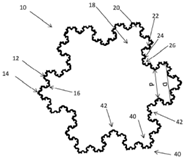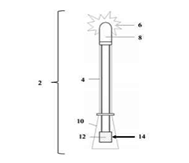Background
AI has increasingly been utilized in the inventive process, with the rapid development of AI technologies. This trend increased the number of international patent applications (PCT) that have listed AI as an inventor.
【PCT Appl. of AI Invention (Mar. 12, 2020, National Appl.)】
As a PCT application** that was filed by artificial intelligence (AI) systems developer Dr. Stephen Thaler(US) and named AI as an inventor ‘DABUS’, it was filed with 16 countries, including the Republic of Korea. The applicant claimed that he has a lack of knowledge of the inventions and that ‘DABUS’ created of itself two inventions, such as a food container, etc., after learning general knowledge.
* DABUS : Device for the Autonomous Bootstrapping of Unified Sentience** Effect of simultaneous applications to several nations with only an application; and substantive examination is conducted in the national phase.
-
However, the Patent Acts of major countries define that an inventor or a successor in title will be granted with a patent. Also, a natural person only is practically acknowledged as an inventor.
* Article 33 (Persons Entitled to Patent) ① A person who makes an invention or his or her successor shall be entitled to a patent under this Act.
→ Issues of ‘Whether to Accept AI as an Inventor’, etc., are extensively discussed globally.
Current Status of National Examinations and Lawsuits
▶ Summary of application
- 【Appl. number】 No. 10-2020-7007394 (PCT application date: Sep. 17, 2019)
- 【Applicant】 Thaler Stephen El.
- 【Inventor】DABUS, the disclosed invention was autonomously generated by artificial intelligence.
- 【Title of Invention】 FOOD CONTAINER AND DEVICES AND METHODS FOR ATTRACTING ENHANCED ATTENTION
※ (Priority claim) ①EP18275163(FOOD CONTAINER) ②EP18275174(DEVICES AND METHODS FOR ATTRACTING ENHANCED ATTENTION)
| The First Invention | The Second Invention | |
|---|---|---|
| Title of Invention | FOOD CONTAINER | NEUROSTIMULATION LAMP FOR ATTRACTING IMPROVED ATTENTION |
| Drawing |  |
 |
| Content | A food container having a fractal structure with recessed and convex parts in and out of the container | A lamp that mimics neural motion-patterns and emits a noticeable blinking light |
| Effect | Easy connection between containers; and high efficiency in heat transfer; and easy grab | To attract improved attention with a lamp's motion pattern |
(Examination result) An amendment is requested (Feb. 2022) on the ground that AI cannot become an inventor because it is not a natural person, but the application has been invalidated because the applicant did not amend the inventor as a natural person (Sep. 2022).
- (Administrative lawsuit) An administrative lawsuit* was requested (Dec. 20, 2022) to the effect that the invalidation should be revoked, but the Seoul Administrative Court dismissed the request (Jun. 30, 2023).
Current Status of International Lawsuits
Major countries, such as US, UK, etc., rejected the application on the ground that a human being only will be listed as an inventor by law, but some other countries, such as Australia, Germany, etc., have ruled from a different perspective.
▶ Current status of lawsuits of major countries
- (US) The U.S. District Court for the Eastern District of Virginia (Sep. 2021) and the U.S. Circuit Courts of appeals (Aug. 2022) dismissed the appeal to the effect that a natural person only is recognized as an inventor → The U.S. Supreme Court also dismissed the appeal (Apr. 2023)
- (UK) The 1st instance court (Sep. 2020) and the UK Courts of Appeal (Sep. 2021) dismissed the appeal to the effect that AI cannot be named as an inventor → The UK Supreme Court also dismissed the appeal (Dec. 2023)
- (Australia) The 1st instance court recognized AI as an inventor on the ground that there is not explicit provision(s) in the Patent Act, but the Court of Appeal recognized a natural person only as an inventor, and therefore the lower court’s decision was reversed (Apr. 2022) → The Supreme Court confirmed the decision (Nov. 2022)
- (Germany) The Bundespatentgericht (BPatG) decided that it acknowledges a natural person only as an inventor, however, that it permits* to describe AI information in parallel when an inventor is named (Mar. 2022) → The hearing is proceeding before the Supreme Court
Discussion of AI Inventorship At Home and Abroad
① National (Experts) Holding a meeting* by organizing experts consultative group (legal/technological/industrial experts) to discuss AI invention related issues (6 times in total, Aug.-Sep. 2021)
* (Legal) A total of 15 persons (‘AI’ papers authors (Prof., laywers), (Technological) A total of 14 persons (Prof. of AI specialized graduate schools, researchers, etc.), (Industrial) A total of 11 persons (persons in charge of AI businesses from Samsung, NAVER, Kakao, etc.)▶ Discussion results
- (Technologically)Impossible for AI to autonomously create an invention without intervention of a human being* at present * Deemed on the surface that AI has made an invention, but a human being substantially and considerably has intervened in the inventive process
- (Legally) A majority (70%) claimed that there is no void in legal protection because a human being only is allowed to be named as an inventor by law even though AI is either a tool of an invention* or a joint inventor. * AI identity: A tool of an invention (57%), Possible to become a joint inventor in the future (40%)
- (International harmonization) A majority (70%) is in a position that international harmonization is important for IP rights*, but that interests from preemptive legislation will not be as large as expected, in view of AI industry’s development at home. * A patent application regarding core invention is generally filed overseas, so there would be issues to be raised if IP systems, especially regarding AI inventions, are different by nation.
② National (Study of Legal System) Conducting 「A study on a methodology for granting a patent to an AI-generated invention」 for reviewing legal issues preemptively and in a future oriented manner (~Jan. 2022)
lINK- (Major Contents) Reviewing major issues, such as necessity of granting a legal personality to AI, attribution of ownership of an AI invention, necessity of protection of AI-generated inventions by law, protection methodology, revision of the patent law, etc.
③ National (AI White Paper) Publication of 「AI and IP*」 for leading international discussion (Mar. 2022)
lINK- (Major Contents) Major countries’ approaches to the DABUS case which claims an AI inventor, current status of AI inventor related discussion at home and abroad, reviewing of the similar legal system (copyright law), etc. * International IP experts, including a patent agent of the DABUS application (Ryan Abbot), have expressed big interests, and we shared data with other IP offices, such as IP Australia, etc., the Presidential Council on Intellectual Property (PCIP), the Ministry of Trade, Industry and Energy, the Parliamentary Office, etc.
④ Int’ l (International Conference) At the International Conference, hosted by MOIP and participated* by a total of 7 offices from the U.S., Europe, etc., AI inventorship related issues, such as protection of AI inventions, necessity of the legislation, international harmonization, etc., were discussed (Dec. 2021).
* Rep. of Korea, US, EPO, China, UK, Australia, Canada- (Major opinions) ➊Essentiality of international harmonization when the legal system is revised, ➋In the process of establishing the pan-governmental AI-related strategy, ➌In view of the intervention of a human being in the inventive process, low necessity of the legislation at present
⑤ Int’ l (WIPO* Conversation on IP and AI) At the 「WIPO Conversation on IP and AI」**, domestic and international experts discussed AI inventorship and the published white paper was presented (Sep. 2022).
* World Intellectual Property Organization (WIPO): Special organization under the UN, governing international IP system, policy, etc. (Established in 1967, 193 nations joined) ** An international forum hosted by WIPO since 2019 for international discussion of IP and AI⑥ Int’ l (Adopted as WIPO agenda) ‘Study on the law/legal system regarding protection of AI-generated inventions’ was adopted as a new agenda* at the 34th WIPO SCP (Sep. 2022)
* It was agreed, at the 35th SCP held in Oct. 2023, that each country presents its law and legal system regarding AI inventorship and that an AI expert of the Ecole polytechnique fédérale de Lausanne (EPFL) is invited to present AI capacity for invention.⑦ Int’ l (Discussion between European IP offices) UK, France, Germany, etc. shared and discussed the positions on AI inventorship and a future policy direction at the high ranking officials meeting (Dec. 2022).
⑧ Int’ l (Endorsement as IP5* agenda) MOIP proposed an agenda of ‘Sharing of the Legal System and Court Cases regarding an AI Inventor’ and got a final endorsement at the IP5 Heads of Offices Meeting**(Jun. 2023)
* The cooperation body launched in 2007 for work-sharing between MOIP·USPTO·JPO·CNIPA·EPO ** Scheduled to publish the final outcome on the IP5 official website after presenting it at the IP5 Heads of Offices Meeting in 2024- Last updated 23 May 2024
- Patent Legal Administration Division
